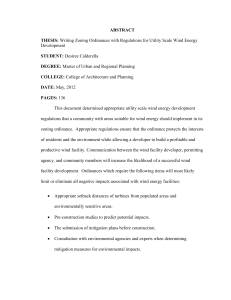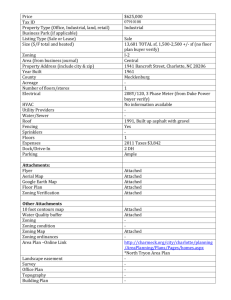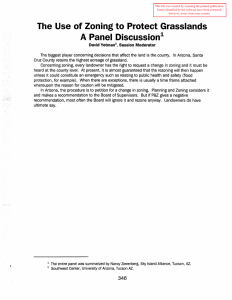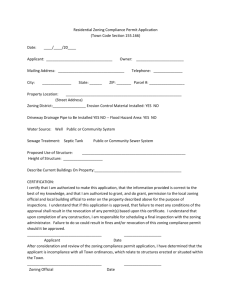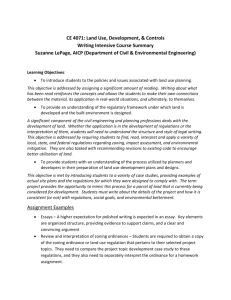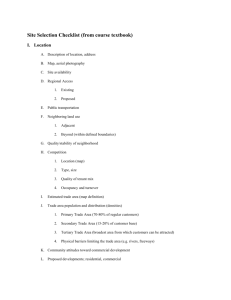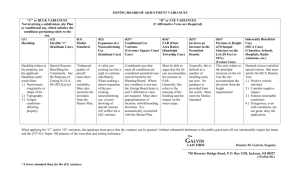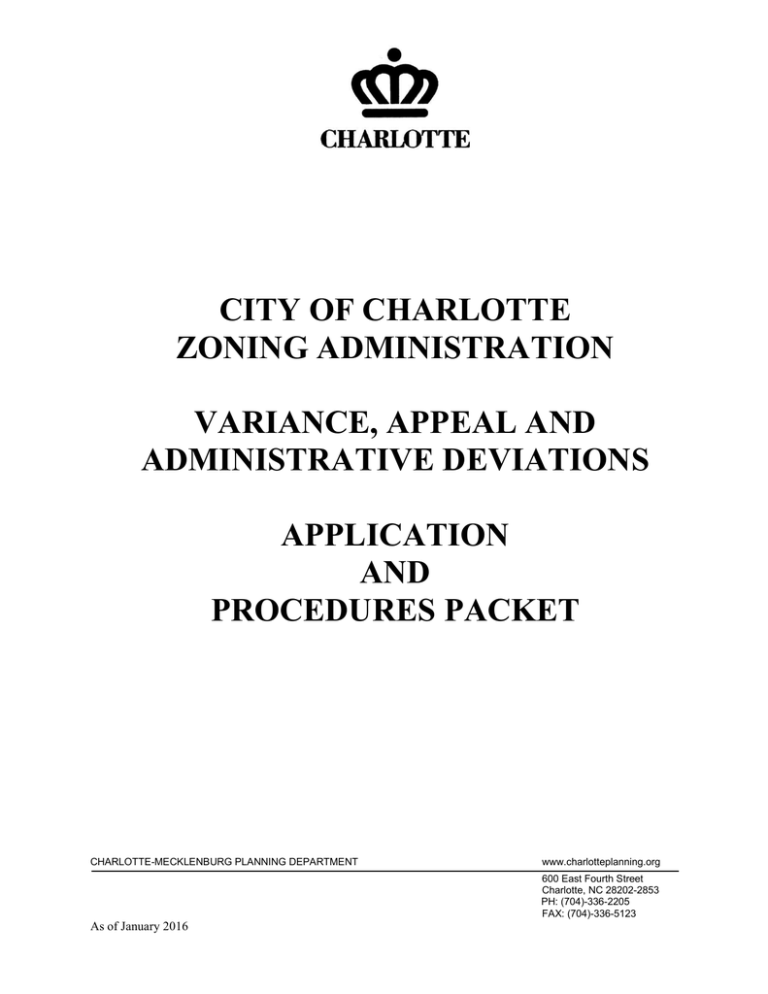
CITY OF CHARLOTTE
ZONING ADMINISTRATION
VARIANCE, APPEAL AND
ADMINISTRATIVE DEVIATIONS
APPLICATION
AND
PROCEDURES PACKET
CHARLOTTE-MECKLENBURG PLANNING DEPARTMENT
www.charlotteplanning.org
600 East Fourth Street
Charlotte, NC 28202-2853
PH: (704)-336-2205
FAX: (704)-336-5123
As of January 2016
TABLE OF CONTENTS
Types of Requests………………………………………….....….………………….. 1
Application Procedures and Instructions .………………………………………….... 2
Application Processing by Staff……………………………………………………... 3
Hearing Procedures………………………………………………………………….. 4
Hearing Request Application (Form 1) …………………………………………… 5
Variance Request Checklist and Instructions .………………………………………. 6
Variance Application (Form 2)…………………………………………………. 7 & 8
Appeal Request Checklist and Instructions ………………………………………… 9
Appeal Application (Form 3)………………………………………..…………10 & 11
Administrative Deviation Request Checklist and Instructions ……………….…......12
Administrative Deviation Request Application (Form 4)………………...……13 & 14
Schedule of Meetings and Submission Deadlines ……………………………….......15
Schedule of Fees …………………………………………………...……..….16 thru 18
Authorized Practice Advisory Opinion 2006-1 Statement …………………….19 & 20
i
Types of Requests
There are three types of requests handled by Zoning Administration staff and the Zoning Board of Adjustment as
authorized by Chapters 4 and 5 of the Charlotte Zoning Ordinance. Below, please find a brief description of each
request type.
1.
Variance Request – (Submit forms 1 and 2 only)
This is a request to vary the standards of the Zoning Ordinance. One common variance request is for
an applicant to seek relief from a front setback or side/rear yard requirement.
Example: An applicant requests to allow their house to be located 40 feet from their rear property line
rather than 45 feet as required by zoning ordinance section 9.205 (1) (g) for an R-3 zoning district.
Decision Maker: Zoning Board of Adjustment
Requirements (all three must be true):
a. The difficulty or hardship would result only from these regulations and from no other cause,
including the actions of the owner or previous owners of the property ; and
b. The difficulty or hardship is peculiar to the property in question and is not generally shared by
other properties in the same neighborhood and/or used for the same purposes; and
c. The request must be consistent with the spirit, purpose, and intent of the ordinance.
2.
Appeal Request – (Submit forms 1 and 3 only)
This type of request is initiated when an applicant feels that the zoning administrator, enforcement
officer or plans reviewer has made an error in applying the standards of the zoning ordinance. One
common appeal results from a disagreement between an applicant and enforcement officer when a
Notice of Violation has been issued for an alleged violation of the zoning ordinance.
Example: An applicant receives a Notice of Violation for running a business in a residential zoning
district, however, the applicant claims that the business is grandfathered because it was established
prior to the adoption of the zoning ordinance and has been in continuous operation since its
establishment.
Decision Maker: Zoning Board of Adjustment
Requirements: An error in the application of the ordinance must be found in order to reverse the
decision of the zoning administrator, enforcement officer or plans reviewer.
3.
Administrative Deviation Request – (Submit forms 1 and 4 only)
Section 4.107 of the zoning ordinance authorizes the zoning administrator to provide limited relief
from quantifiable ordinance requirements. Allowable deviations include deviations from yard and
buffer requirements for up to a 2 foot encroachment (3 feet for HVAC units), up to a 5 percent
deviation for other quantifiable ordinance requirements, and encroachments for handicap ramps.
Example: An applicant requests permission to place an air conditioning unit 3 feet from the side
property line rather than 5 feet as required by zoning ordinance section 9.205 (1) (f) for an R-4 zoning
district.
Decision Maker: Zoning Administrator
Requirements (at least one must be true):
a. There must be something peculiar about the lot that would be a basis for an inadvertent error; or
b. The physical layout of the lot and structures makes adherence to the standard impractical; or
c. Application of the ordinance standard would not serve a useful purpose; or
d. The applicant has agreed to measures that would reduce the impact of the requested deviation on
adjacent property owners.
1
Application Procedures and Instructions
The following is the general instructions for filing any of the three requests discussed above. Specific application
submittal checklists and instructions are included later for each of the forms described below:
Submission of Application Forms
a.
Pre-meeting Requirement. A pre-meeting with zoning administration staff is required prior to the
submission of any type of application. Please contact 704-336-3818 to set up an appointment.
b.
Application Deadlines. Applications must be submitted in accordance with the Schedule of Meetings
and Submission Deadlines on page 15 of this packet. Please note that a request for an appeal must be
filed within 30 days from receipt of the written decision or receipt or actual or constructive notice of
the written decision. Appeals of HDC decisions must be filed within 60 days from the date of the
issuance or denial of the Certificate of Appropriateness. A maximum of 10 cases are scheduled for
each Board of Adjustment meeting.
c.
Application Types
i. For a variance request, please complete forms 1 and 2 and submit with the required materials
indicated on the Variance Request Checklist on page 6.
ii. For an appeal request, please complete forms 1 and 3 and submit with the required materials
indicated on the Appeal Request Checklist on page 9.
iii. For an administrative deviation request, please complete forms 1 and 4 and submit with the
required materials indicated on the Administrative Deviation Request Checklist on page 12.
d.
Fees. All applications must be filed with the non-refundable fee as outlined in the Schedule of Fees on
page 16.
e.
Application Filing. All applications must be filed in person at the Planning Department’s office. Our
office is located on the 8th floor of the Charlotte-Mecklenburg Government Center (600 East 4th Street).
An appointment is strongly encouraged. To schedule an appointment please call 704-336-3818.
f.
Signature Required. Make sure each form is properly signed. Unsigned applications cannot be
accepted.
g.
Completeness Requirement. Illegible and incomplete applications cannot be accepted. Applicants
are strongly encouraged to type their applications. Electronic versions of these applications are
available at www.charmeck.org/Departments/Planning.
h.
Application Copies. One (1) copy for administrative deviation requests.
Fifteen (15) copies for variance and appeal requests including original of your application and all
required materials (per the applicable checklist) must be submitted for your submission to be
considered complete. Please fold larger maps and other materials to 8 ½ x 14 inch size.
2
Application Processing by Staff
The following describes how staff handles your application once submitted:
Staff Processing
a.
Check for Completeness. Staff will ensure that the application is complete and signed by the
appropriate parties.
b.
Schedule the Case. The clerk will assign a case number and hearing date. Please note that there is a
10 case limit per hearing date.
c.
Alternatives Analysis. Staff will review your application and the ordinance to determine if any
alternatives exist during your pre-application meeting.
d.
Site Visit. Staff will visit the site and take photographs for use at the hearing.
e.
Adjacent Property Owner Notification. The clerk will prepare and mail hearing notices to adjoining
property owners, the applicant and agent.
f.
Packets Sent to Board Members. Meeting agendas and application packets are mailed to Board of
Adjustment members approximately 10 days prior to the hearing date.
g.
Staff Report. Staff will prepare a staff report and make a recommendation (variances and appeals) or
decision (administrative deviations) on the request.
h.
Public Hearing. A public hearing is held for all cases that require Board of Adjustment action.
Meeting dates and times are outlined in the Schedule of Meetings and Submission Deadlines on page
15.
3
Hearing Procedures
The following describes how the Board of Adjustment conducts appeal and variance hearings:
1. Order for each Board of Adjustment Agenda Item:
a. The chairman will ask all those wishing to speak on an item to stand and be sworn in. All
testimony must be given under oath.
b. A Zoning Administration staff member will explain why a permit was denied, or why a variance
is requested and offer staff’s recommendation.
c. The Board may question the staff member, and then the Applicant may question the staff
member.
d. The Applicant presents his testimony for this case.
e. The Board may question the Applicant, and the staff member may question the Applicant.
f. The Applicant may present sworn witnesses. They will be subject to questioning.
g. Other parties wishing to speak, pro or con, will be given reasonable time to present sworn
testimony.
h. The staff and then the Applicant will be given an opportunity for rebuttal and final comments.
2.
Sworn Testimony. The Board is acting in a quasi-judicial capacity for purposes of this hearing and
can accept only sworn testimony. While the Board will not specifically exclude hearsay evidence, it is
only given limited weight.
3.
Legal Representation. If you choose, an attorney may represent you at the hearing at your expense.
4.
Speaker Registration. All parties who plan to give testimony, pro or con, must complete the blue
form to speak. The blue form is available in the meeting room.
5.
Board Decision. After hearing all cases, the Board will review each case and render a decision within
a reasonable time. This is usually done in a closed discussion with deliberations immediately
following the morning cases and then again after the afternoon cases.
a. You may remain present during the deliberations, or
b. You may call the Zoning staff after the session to receive the decision of the Board.
6.
Exhibits. All exhibits must remain with the Board. At the hearing, first hand exhibits to the clerk for
tagging, you may then proceed to present the exhibit to the Board. If your case is not appealed to
Superior Court thirty (30) days after the Board’s decision is filed, you may pick up your exhibits.
Exhibits not picked up will be destroyed.
7.
Conflict of Interest. If you feel there is a conflict of interest of any Member of the Board or an
association that would prejudice your case, please let it be known at the start of your case.
8.
Appeals. Appeal from this Board is to the Mecklenburg County Superior Court. You have thirty (30)
days from the later of: (a) the decision of the board is effective, or (b) a written copy of the decision is
delivered in accordance with NCGS 160A-388(e2)(1).
9.
Please turn off your cell phone and other electronic devices.
10. Help the Board run an efficient meeting:
a. Keep testimony to the relevant facts of the case. Board members review your application packet
prior to the meeting so they will be familiar with your request.
b. Do not repeat testimony.
c. Hearsay evidence can be given only limited weight. Applicants and witnesses should have firsthand knowledge of the situation.
The City of Charlotte will comply with the American with Disabilities Act (ADA), which prohibits
discrimination on the basis of disability. If you need special accommodations to attend and
participate in the meeting or need this information in an alternative format because of your disability,
please contact the Zoning Administration staff at 704-336-3818 at least 72 hours prior to the meeting.
4
Hearing Request Application - Form 1
Zoning Board of Adjustment
City of Charlotte
Date Filed:_______________
Case Number:__________________
Received by:________________
Instructions
This form must be filed out completely. Please attach the appropriate additional form
depending on your request type along with required information as outlined in the appropriate
checklist. Please type or print legibly. All property owners must sign and consent to this
application, attach additional sheets if necessary. If the applicant is not the owner, the owners must
sign the Designation of Agent section at the bottom of this form.
The Applicant Hereby (check all that apply):
□ Requests a variance from the provisions of the zoning ordinance as stated on Form 2
□ Appeals the determination of a zoning official/HDC COA as stated on Form 3
□ Requests an administrative deviation as stated on Form 4
Applicant or Agent’s Name:_______________________________________________________________
Mailing Address:________________________________________________________________
City, State, Zip:_________________________________________________________________
Daytime Telephone:___________________ Email Address:_____________________________
Interest in this Case (please circle one):
Owner
Adjacent Owner
Other
Property Owner(s) [if other than applicant/agent]:______________________________________________
Mailing Address:________________________________________________________________
City, State, Zip:_________________________________________________________________
Daytime Telephone:___________________ Email Address:_____________________________
Property Address:_______________________________________________________________________
Tax Parcel Number:_____________________
Zoning District:______________________
Subdivision Name:______________________
Conditional District:
YES
NO
Applicant Certification and Designation of Agent
I (we) certify that the information in this application, the attached form(s) and documents submitted by me
(us) as part of this application are true and correct. In the event any information given is found to be false,
any decision rendered may be revoked at any time. I (we) hereby appoint the person named above as my
(our) agent to represent me (us) in this application and all proceedings related to it. I (we) further certify to
have received, read and acknowledged the information and requirements outlined in this packet.
______________________
Date
________________________________________
Property Owner
_______________________
Date
________________________________________
Property Owner
5
Variance Request Checklist and Instructions
Limitations
1.
The Board of Adjustment is prohibited from granting use variances. A use variance is a request that
would allow the establishment of a use not otherwise permitted in a particular zoning district.
Instructions
1.
Fill out the form completely. Because the board must find evidence to support each of the
questions/statements, the answer “not applicable” is generally not acceptable and will delay your
request. Incomplete applications cannot be accepted.
2.
In order for the Board to grant a variance, an unnecessary land hardship must be demonstrated.
Per Section 5.108 of the zoning ordinance, only the following conditions shall constitute a hardship (all
three must be met):
a.
The difficulty or hardship would result only from these regulations and from no other cause,
including the actions of the owner or previous owners of the property; and
b.
The difficulty or hardship is peculiar to the property in question and is not generally shared by
other properties in the same neighborhood and/or used for the same purposes; and
c.
The request must be consistent with the spirit, purpose, and intent of the ordinance.
Checklist
□
15 copies of your signed application (includes one original) and all required materials (per the
applicable checklist) must be submitted for your submission to be considered complete. Please fold
larger maps and other materials to 8 ½ x 14 inch size.
□
If applicable, attach a copy of your permit or plan review comments if this variance resulted from a
permit or plan denial.
□
If this is a new construction project or requested to do so in your pre application meeting, attach an
address verification form available by contacting 704-336-6175.
□
□
A survey or to scale site plan must be included. The survey or site plan should include:
all existing buildings and structures on the property
all easements for streets, utilities, driveways and others
all proposed improvements should be drawn on the survey or site plan to scale
shade in the map to highlight the portion of the improvements that are subject to the requested
variance (i.e. for a setback variance, the amount beyond the setback line)
Architectural drawings are strongly encouraged to assist the Board in determining if the request is in
harmony with the surrounding neighborhood.
Additional Information
1.
If construction has started, no further work shall be done on those portions of the project in violation of
the zoning ordinance.
2.
If this variance request is a result of a Notice of Violation, no further enforcement action shall be taken
by the City until the Board of Adjustment makes a decision regarding your case.
3.
Per section 5.112 of the zoning ordinance, once a case has been heard, the Board may not hear the
same case for a period of two years.
6
Variance Application - Form 2
Zoning Board of Adjustment
City of Charlotte
Date Filed:_______________
Case Number:__________________
Has work started on this project?
If yes, did you obtain a building permit?
Have you received a Notice of Violation
or Stop Work Order for this project?
Has this property been rezoned?
Fee Collected:_______________
YES
YES
NO
NO
If yes, attach a copy.
YES
YES
NO
NO
If yes, attach a copy.
If yes, Petition Number: ________
(1) From what zoning ordinance section numbers are you seeking a variance? Please list each section, the
requirement, and the requested variance.
Item
Example
A
Code Section
9.205 (1)(g)
Code Requirement
45 foot rear yard
Variance Request
35 foot rear yard (10 foot reduction from required)
B
C
D
E
(2) Please describe why the variances requested are necessary.
(3) THERE ARE UNNECESSARY HARDSHIPS IN THE WAY OF CARRYING OUT THE STRICT
LETTER OF THE ORDINANCE. The courts have developed rules to determine whether, in a particular
situation, "practical difficulties or unnecessary hardships" exist. State facts and arguments in support of each of
the following:
(a) The hardship of which the Applicant complains results from unique circumstances related to the
Applicant's land such as location, size, or topography. (Note: Hardships common to an entire
neighborhood, resulting from overly restrictive zoning regulations, should be referred to the CharlotteMecklenburg Planning Department. Also, unique personal or family hardships are irrelevant since a
variance, if granted, runs with the life of the land.)
7
(b) The hardship is not the result of the Applicant's own actions. The act of purchasing property with
knowledge that circumstances exist that may justify granting of a variance shall not be regarded as a selfcreated hardship.
(4) THE VARIANCE IS CONSISTENT WITH THE SPIRIT, PURPOSE, AND INTENT OF THE
ORDINANCE (State facts and arguments to show that the requested variance represents the least possible
deviation from the letter of the Ordinance to allow a reasonable use of the land; and, that the use of the
property, if the variance is granted, will not substantially detract from the character of the neighborhood.)
(5) THE GRANTING OF THE VARIANCE SECURES THE PUBLIC SAFETY AND ACHIEVES
SUBSTANTIAL JUSTICE. (State facts and arguments to show that, on balance, if the variance is approved,
the benefit received by the Applicant will substantially outweigh the harm suffered by to the public.)
8
Appeal Request Checklist and Instructions
Limitations
1.
The Board of Adjustment may only reverse an order or finding of a zoning staff member if they find
that an ordinance provision was applied in error. This application must be filed within thirty (30) days
of a Notice of Violation or the written interpretation/decision of the Zoning Administrator or other City
zoning staff member. Applications filed more than 30 days after a written decision or violation notice
cannot be accepted.
2.
The Board of Adjustment may affirm, reverse, or modify any HDC decision after determining if there
was an error of law or no competent or substantial evidence to support the HDC decision. This
application must be filed within sixty (60) days from the date of the issuance or denial of the
Certificate of Appropriateness. Applications filed more than 60 days cannot be accepted.
Instructions
1.
Fill out the form completely. Because the board must find evidence to support each of the
questions/statements, the answer “not applicable” is generally not acceptable and will delay your
request. Incomplete applications cannot be accepted.
Checklist
□
15 copies of your signed application (includes one original) and all required materials (per the
applicable checklist) must be submitted for your submission to be considered complete. Please fold
larger maps and other materials to 8 ½ x 14 inch size.
□
If applicable, attach a copy of your permit or plan review comments if this appeal resulted from a
permit or plan denial. In addition, submit a copy of your submitted site plan and highlight those areas
that are subject to this appeal.
□
If applicable, attach a copy of your Notice of Violation if this appeal resulted from an alleged violation
of the zoning ordinance.
□
If this is a new construction project or requested to do so in your pre-application meeting, attach an
address verification form available by contacting 704-336-6175.
Additional Information
1.
If construction has started, no further work shall be done on those portions of the project in violation
of the zoning ordinance.
2.
If this appeal request is a result of a Notice of Violation, no further enforcement action shall be taken
by the City until the Zoning Administrator makes a decision regarding your request.
3.
Per section 5.112 of the zoning ordinance, once a case has been heard, the Board may not hear the
same case for a period of two years
9
Appeal Application - Form 3
Zoning Board of Adjustment
City of Charlotte
Date Filed:_______________
Case Number:__________________
Has work started on this project?
If yes, did you obtain a building permit?
Have you received a Notice of Violation
or Stop Work Order for this project?
Has this property been rezoned?
Fee Collected:_______________
YES
YES
NO
NO
If yes, attach a copy.
YES
YES
NO
NO
If yes, attach a copy.
If yes, Petition Number: ________
(1) What zoning ordinance section numbers do you allege were applied in error? Please list each section, the
requirement and the requested variance.
Item
Example
A
Code Section
9.205 (1)(g)
Code Requirement
45 foot rear yard
B
C
D
E
(2) Please describe why you feel the code sections listed above where applied in error. Tell the Board what you
feel is the appropriate application of each code section.
(a) Code Section ________________________________
(b) Code Section ________________________________
10
(c) Code Section ________________________________
(d) Code Section ________________________________
(e) Code Section ________________________________
11
Administrative Deviation Request Checklist and Instructions
Limitations
1.
Deviation requests may not exceed 5% of quantifiable standards. Approvals may only be granted if
one of the following conditions is present:
a.
The physical layout of the land, street or other geographical or topographical feature lead to an
inadvertent error; or
b.
The existing physical layout of the land or structures upon it prevent compliance; or
c.
Due to the nature of the adjacent land use or lay of the land, the application of the ordinance
requirement would serve no useful purpose; or
d.
The applicant has agreed to measures that would mitigate the requested deviation.
2.
Yard and Buffer Requests Only - Deviation requests for a yard or buffer requirement are limited to
two (2) feet except when involving heating and air conditioning units when a three (3) foot deviation
may be requested.
3.
The Zoning Administrator may only apply items 1 or 2 above. He/she may not apply both items.
4.
Handicap Ramps and Similar Structures Only. When required by law, the Zoning Administrator
may approve an encroachment for a handicap ramp or other similar structure when no other reasonable
location is feasible.
Instructions
1.
Fill out the form completely. The Zoning Administrator must find evidence to support each of the
required findings in order to approve your request. Incomplete applications cannot be accepted.
Checklist
□
If applicable, attach a copy of your permit or plan review comments if this variance resulted from a
permit or plan denial.
□
If this is a new construction project or requested to do so in your pre-application meeting, attach an
address verification form available by contacting 704-336-6175.
□
A survey or to scale site plan must be included. The survey or site plan should include:
all existing buildings and structures on the property
all easements for streets, utilities, driveways and others
all proposed improvements should be drawn on the survey or site plan to scale
shade in the map to highlight the portion of the improvements that are subject to the requested
deviation (i.e. for a setback variance, the portion of the structure beyond the setback line)
Additional Information
1.
If construction has started, no further work shall be done on those portions of the project in violation of
the zoning ordinance.
2.
If this deviation request is a result of a Notice of Violation, no further enforcement action shall be
taken by the City until the Zoning Administrator makes a decision regarding your request.
3.
Per section 4.107 (4) (c) of the zoning ordinance, if an aggrieved person objects to the requested
deviation with a stated reason, the Zoning Administrator must deny the request and the applicant
would need to file for a Variance Hearing with the Board of Adjustment.
12
Administrative Deviation Application - Form 4
Zoning Administrator
City of Charlotte
Date Filed:_______________
Case Number:__________________
Has work started on this project?
If yes, did you obtain a building permit?
Have you received a Notice of Violation
or Stop Work Order for this project?
Has this property been rezoned?
Fee Collected:_______________
YES
YES
NO
NO
If yes, attach a copy.
YES
YES
NO
NO
If yes, attach a copy.
If yes, Petition Number: ________
The requested deviation is for (place an X under the applicable categories):
Yard
Requirement
Buffer
Requirement
Involves a Heating or
Air Conditioning Unit
Other Measurable
Requirement
Handicap Ramp or Similar
Structure Required by Law
(1) What zoning ordinance section numbers are you seeking a deviation from? Please list each section, the
requirement and the requested variance.
Item
Example
A
B
C
D
E
F
Code Section
9.205 (1)(g)
Code Requirement
45 foot rear yard
Deviation Request
35 foot rear yard (10 foot reduction from required)
(2) Please describe why the deviations requested are necessary.
(3) In the following spaces, indicate the facts and the arguments to support your request.
(a) The physical contour of the street, the land, or some other topographical or geographical feature is the
basis for a surveying or other inadvertent error.
13
(b) The physical layout of the land and structures on the land are such that Ordinance requirements
cannot be met.
(c) Because of the nature of the abutting property or intervening topographical or geographical features,
the application of the Ordinance requirements would not serve a useful purpose.
(d) If an inadvertent error by a City staff member, surveyor, contractor, building inspector or other similar
individual is involved please describe the nature of the error and provide the name and contact
information for the person who made the error.
(e) The applicant agrees to the measures listed below to mitigate the impact of the requested deviation.
(4) For handicap ramps and other similar structures, please indicate why the improvement is necessary and
explain why there is no other feasible location that would comply with the zoning ordinance.
14
Schedule of Meetings and Submission Deadlines
2016
Zoning Board of Adjustment
Meeting Date
Filing Deadline
January 26th
December 23, 2015
February 23rd
January 22nd
March 29th
February 26th
April 26th
March 25th
May 31st
April 29th
June 28th
May 27th
July 26th
June 24th
August 30th
July 29th
September 27th
August 26th
October 25th
September 23rd
November 29th
October 28th
December 13th
November 11th
*Meeting dates are subject to change!
15
SERVICE:
ZONING ADMINISTRATION APPEALS (Residential & Commercial)
DESCRIPTION:
A review of a decision, interpretation, order, requirement or determination
made by the Zoning Administrator.
COORDINATING AGENCY:
Charlotte-Mecklenburg Planning Department
600 East Fourth Street
Charlotte, North Carolina 28202-2853
(704) 336-2205
CONTACT PERSON:
Sonda Kennedy, Board of Adjustment Clerk
REQUIRED DOCUMENTATION:
Application signed and dated by property owner. (15 copies including original)
See application and procedure packet for instructions.
PRE-MEETING REQUIREMENT:
A pre-meeting with Zoning Administration staff is required prior to the
submission of any type of application. Please contact 704-336-3818 to
schedule an appointment.
REFERENCE DOCUMENT:
City of Charlotte Zoning Ordinance
SPECIAL REQUIREMENTS:
Written facts/evidence to lead the Board to conclude that the decision,
interpretation, etc. of the Zoning Administrator is erroneous.
APPROXIMATE REVIEW PERIOD:
2 months
FEE AMOUNT:
EFFECTIVE JULY 1, 2015
RESIDENTIAL
$175.00
COMMERCIAL
$400.00
Fee due upon submittal of application, payable by check or money order to the City of Charlotte.
To download applications visit our Web Site: www.CharlottePlanning.org
16
SERVICE:
ZONING ADMINISTRATION VARIANCES (Residential & Commercial)
DESCRIPTION:
A request for a variance from the requirements of the Zoning Ordinance which
relate to uses of land or the establishment, extension, or use of structures.
COORDINATING AGENCY:
Charlotte-Mecklenburg Planning Department
600 East Fourth Street
Charlotte, North Carolina 28202-2853
(704) 336-2205
CONTACT PERSON:
Sonda Kennedy, Board of Adjustment Clerk
REQUIRED DOCUMENTATION:
Application signed and dated by property owner. (15 copies including original)
See application and procedure packet for instructions.
PRE-MEETING REQUIREMENT:
A pre-meeting with Zoning Administration staff is required prior to the
submission of any type of application. Please contact 704-336-3818 to
schedule an appointment.
REFERENCE DOCUMENT:
City of Charlotte Zoning Ordinance
SPECIAL REQUIREMENTS:
Physical survey (NOT to exceed 8 ½” X 11”) or scaled drawing describing the
property and providing dimensions and distances.
APPROXIMATE REVIEW PERIOD:
2 months
FEE AMOUNT:
EFFECTIVE JULY 1, 2015
RESIDENTIAL
$700.00
COMMERCIAL
$1650.00
Fee due upon submittal of application, payable by check or money order to the City of Charlotte.
To download applications visit our Web Site: www.CharlottePlanning.org
17
SERVICE:
ZONING ADMINISTRATION – ADMINISTRATIVE DEVIATIONS
(Residential & Commercial)
DESCRIPTION:
A request for a minor deviation from the requirements of the Zoning Ordinance
which relate to uses of land or the establishment, extension, or use of structure.
COORDINATING AGENCY:
Charlotte-Mecklenburg Planning Department
600 East Fourth Street
Charlotte, North Carolina 28202-2853
(704) 336-2205
CONTACT PERSON:
Sonda Kennedy, Board of Adjustment Clerk
REQUIRED DOCUMENTATION:
One (1) application signed and dated by the property owner. See application
and procedure packet for instructions.
PRE-MEETING REQUIREMENT:
A pre-meeting with Zoning Administration staff is required prior to the
submission of any type of application. Please contact 704-336-3818 to
schedule an appointment.
REFERENCE DOCUMENT:
City of Charlotte Zoning Ordinance
SPECIAL REQUIREMENTS:
Physical survey (NOT to exceed 8 ½” X 11”) or scaled drawing describing the
property and providing dimensions and distances.
APPROXIMATE REVIEW PERIOD:
2-3 weeks
FEE AMOUNT:
EFFECTIVE JULY 1, 2015
RESIDENTIAL
$200.00
COMMERCIAL
$425.00
Fee due upon submittal of application, payable by check or money order to the City of Charlotte.
To download applications visit our Web Site: www.CharlottePlanning.org
18
Authorized Practice Advisory Opinion 2006-1
October 20, 2006
Quasi-Judicial Hearings on Zoning and Land Use
Inquiry:
May a person who is not a lawyer appear before planning boards, boards of adjustment, or other governmental bodies conducting
quasi-judicial hearings in a representative capacity for another party?
Opinion:
At its October 2005 meeting, the Authorized Practice Committee responded to an inquiry concerning the propriety of a person
who is not a lawyer appearing before planning boards, boards of adjustment, and city and county government in a representative
capacity. The committee's advisory opinion distinguished appearances on legislative concerns, such as general rezoning cases and
ordinance amendments, from appearances on behalf of petitioners for special use permits and variances, which are quasi-judicial
matters. The committee has received comments from a number of interested parties, including architects, land use planners, and
city and county attorneys as a result of that opinion. The committee is issuing this advisory opinion to supplement the prior
opinion.
At its October 2005 meeting, the Authorized Practice Committee responded to an inquiry concerning the propriety of a person
who is not a lawyer appearing before planning boards, boards of adjustment, and city and county government in a representative
capacity. The committee's advisory opinion distinguished appearances on legislative concerns, such as general rezoning cases and
ordinance amendments, from appearances on behalf of petitioners for special use permits and variances, which are quasi-judicial
matters. The committee has received comments from a number of interested parties, including architects, land use planners, and
city and county attorneys as a result of that opinion. The committee is issuing this advisory opinion to supplement the prior
opinion.
First, the committee reiterates that the adoption of ordinances and amendments to official zoning maps (i.e. general rezoning
cases) by the elected officials in city and county governments are legislative in nature and that any interested person may appear
and speak on such matters before governmental bodies, even as representatives of groups or interested parties, without engaging
in the unauthorized practice of law. Nonetheless, the general statutory prohibitions on unauthorized practice of law still apply
even to persons who appear before governmental bodies on legislative matters. Non-lawyers may not hold themselves out as
attorneys, provide legal services or advice, or draft any legal documents with regard to such matters. See N.C. Gen. Stat. §§ 84
2.1 and 4.
The law is clear that hearings on applications for special use permits and variances under zoning ordinances, as well as appeals
from staff level interpretations related to permits, are quasi-judicial proceedings. N.C. Gen. Stat. §§ 153A-345 and 160A-381 and
388. See, Humble Oil & Refining Co. v. Bd. of Aldermen of Chapel Hill, 284 N.C. 458, 202 S.E.2d 129 (1974) and Woodhouse v.
Board of Comm'rs of Nags Head, 299 N.C. 211, 261 S.E.2d 882 (1980). (For simplicity, the quasi-judicial hearings before these
bodies are hereafter referenced to as a "variance hearing" unless the context indicates otherwise.) The governmental body before
which the variance hearing is conducted sits in a judicial role of applying the standards of an ordinance to the particular
circumstances of a particular party. Accordingly, the role of the governmental body is to receive evidence and make decisions
based upon the evidence presented.
Variance hearings require the governmental body hearing the matter to observe certain formalities. Evidence, including witness
evidence, is presented to the hearing body, although the Rules of Evidence need not be strictly observed. All witnesses before the
body must be sworn and their testimony is subject to cross-examination. The hearing body has the power and authority to issue
subpoenas to compel witness testimony. A record of the proceedings must be preserved. The decision is to be based upon the
evidence presented at an open hearing, and not on extraneous matters or personal knowledge of the members of the board. The
applicant has the burden of proof. The board must make written findings of fact to support its decision. And, the decision of the
board is reviewable by the courts on appeal based solely upon the record of the proceedings.
The committee believes that the law is also clear that an appearance on behalf of another person, firm, or corporation in a
representative capacity for the presentation of evidence through others, cross-examination of witnesses, and argument on the law
at a quasi-judicial proceeding is the practice of law. N.C. Gen. Stat. §§ 84 2.1 and 4. Consequently, because the variance hearings
are by definition quasi-judicial proceedings, the committee concludes that it is the unauthorized practice of law for someone other
than a licensed attorney to appear in a representative capacity to advocate the legal position of another person, firm, or
corporation that is a party to the proceeding.
The committee has been urged to recognize that architects, landscape architects, land use planners, and engineers play a vital role
at these quasi-judicial proceedings by presenting necessary facts and information on behalf of their clients at variance hearings.
The committee agrees that the information these professionals can present is critical to the decision before the hearing body.
These professionals are subject matter experts whose expert opinions, as witnesses, must be presented to the hearing body. They
19
are witnesses who are in the best position to explain to the hearing body the facts of the proposed design and its anticipated
effects on a variety of factors, including traffic, environment, and aesthetics, within the framework of matters properly under
consideration at the variance hearing. The committee does not believe that the role of legal advocate by attorneys in quasi-judicial
proceedings should interfere with or inhibit the role of non-lawyer professionals who speak as witnesses and present information
at these quasi-judicial proceedings. In fact, their roles should be complementary.
It is axiomatic that the committee has no authority to amend or formulate exceptions to the statutes. In issuing an advisory
opinion, it simply articulates how it believes a court would ultimately resolve the question for the guidance of the public. The
committee cannot recognize or create exceptions to the law as expressed by the legislature and the courts. Further, we believe, as
a practical matter, that effective representation of parties in variance hearings is becoming increasingly dependent upon legal
advocacy of the rights of the parties with an eye toward compiling a supportable record in the event of an appeal. These are the
skills an attorney provides. While it is true that many of these hearings involve routine and non-controversial matters, even
questions about matters such as the height of residential fences may become the subject matter of an appeal where the appellate
courts may only consider the record produced at the variance hearing. See Robertson v. Zoning Board of Adjustment for the City
of Charlotte, 167 N.C. App. 531, 605 S.E.2d 723 (2004). It is difficult to predict in advance when a matter may require a
comprehensive record for appellate purposes. Therefore, with this further elaboration, the committee re-affirms its initial opinion
expressed by letter dated October 31, 2005, that the representation of another person at a quasi-judicial hearing is the practice of
law.
That said, this opinion should not be interpreted to diminish the role and expertise of land use professionals as witnesses at
variance hearings. These professionals may still present their evidence in support of the position of their clients. However, they
may not examine or cross-examine other witnesses or advocate the legal position of their clients.
The committee's opinion is also not intended to affect the ability of city and county planning staff to present factual information
to the hearing board, including a recitation of the procedural posture of the application, and to offer such opinions as they may be
qualified to make without an attorney for the government present, as the committee understands is the proper, current practice
and role of the planning staff. Further, nothing in this opinion should be interpreted as limiting the ability of a corporate officer or
employee from testifying on factual matters on behalf of a corporate party during a hearing or suggesting that individual parties
may not represent themselves before these boards.
In sum, the committee is of the opinion that land use professionals, including architects, engineers, and land use planners, may
appear and testify as to factual matters and any expert opinions that they are qualified to present at quasi-judicial proceedings, but
the presentation of other evidence, including the examination and cross-examination of witnesses, making legal arguments, and
the advocacy for results on behalf of others before quasi-judicial zoning and land use hearings, is the practice of law that may be
performed only by licensed attorneys at law.
May a person who is not a lawyer appear before planning boards, boards of adjustment, or other governmental bodies conducting
quasi-judicial hearings in a representative capacity for another party?At its October 2005 meeting, the Authorized Practice
Committee responded to an inquiry concerning the propriety of a person who is not a lawyer appearing before planning boards,
boards of adjustment, and city and county government in a representative capacity. The committee's advisory opinion
distinguished appearances on legislative concerns, such as general rezoning cases and ordinance amendments, from appearances
on behalf of petitioners for special use permits and variances, which are quasi-judicial matters. The committee has received
comments from a number of interested parties, including architects, land use planners, and city and county attorneys as a result of
that opinion. The committee is issuing this advisory opinion to supplement the prior opinion.
THE NORTH CAROLINA STATE BAR
208 Fayetteville Street • PO Box 25908 • Raleigh, NC 27611-5908 • 919.828.4620
Copyright © North Carolina State Bar. All rights reserved.
20

